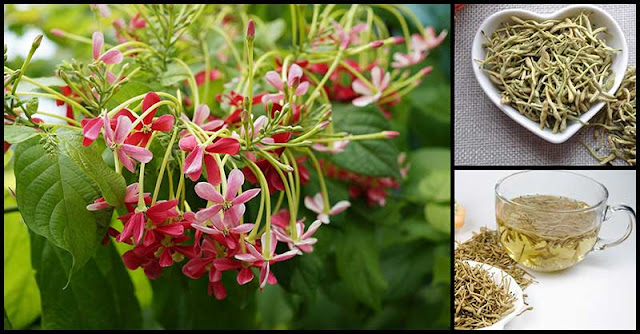Niyog-niyogan, also known as “Chinese honey suckle” or “Rangoon Creeper,” is a plant that grows wild in the backyards. It has fragrant and colorful flowers of white, red, reddish-purple, pink-red to orange. This climbing woody shrub has a tiny fruit with black seeds. It grows best in tropical areas and demands constant sunlight.
Aside from the beautiful flower with a heavenly aroma, Niyog-niyogan is proven to be beneficial in various medical sectors. It possesses many medical values in it and is used to treat many health problems. For medicinal purposes, its leaves, seeds, and roots are used.
According to research, this plant has anti-inflammatory, antipyretic, antioxidants, anti-cancer, and immunomodulatory activity.
Antibacterial Properties Of The Leaves
Extracts from the leaves of Niyog-Niyogan plant possess antibacterial properties that exhibited active antibacterial activity against Bacillus subtilis and partial activity against Staph aureus and S. epidermidis. This activity can be attributed to its flavonoids and terpenoids content.
Anti-Cancer Properties
According to studies, Niyog-niyogan contains three ingredients with a powerful anti-tumor activity that suppresses the growth of specific tumor cell lines that are particularly resistant to many commonly used cytotoxins due to overproduction of a transport protein in the cell wall.
Its leaves contain s flavonoids that have antioxidant properties and its extracts have been found to be effective against free radical-mediated diseases.
Dysuria Or Painful Urination
A tea made from boiling Niyog-niyogan leaves can help provide relief from pain while urinating.
Diabetes
Extract 4 ml juice of Niyog-niyogan flower or juice of fresh leaves. Drink regularly twice a day. This juice can be added to karela juice.
Skin Problems
The extract from the leaves of the plant is used for skin problems such as boils and ulcers. It works effectively to settle boils and abscesses.
Cough And Colds
Take Niyog-niyogan flowers and leaves (1 gm), tulsi leaves, clove in water, and prepare the decoction. Drink this decoction a few times a day.
Intestinal Worms And Parasites
The dried seeds of Niyog-niyogan is also beneficial. This works to treat intestinal worms and parasites.
Digestive Disorders
Niyog-niyogan leaves’ juice can be taken to help treat digestive disorders. Or chew a few leaves of this plant a few times a day.
Diarrhea and Fever
The ripped and roasted fruits of Niyog-niyogan can help control diarrhea and fever.
Other Medicinal Uses:
Decoctions of its roots are also sometimes used as a remedy for rheumatism while its fruits are used as an effective way to relieve toothaches.









